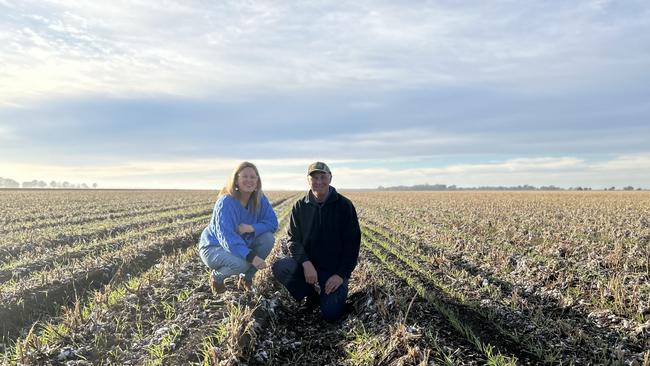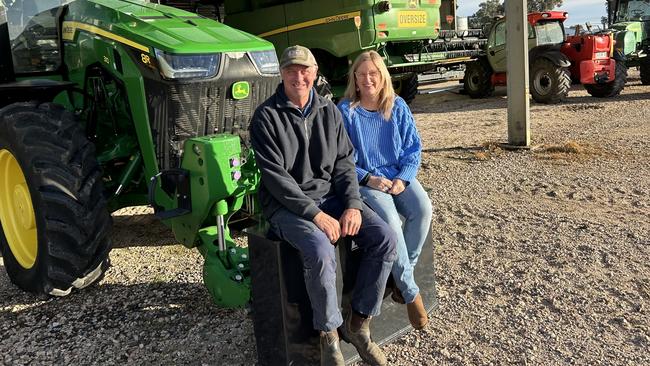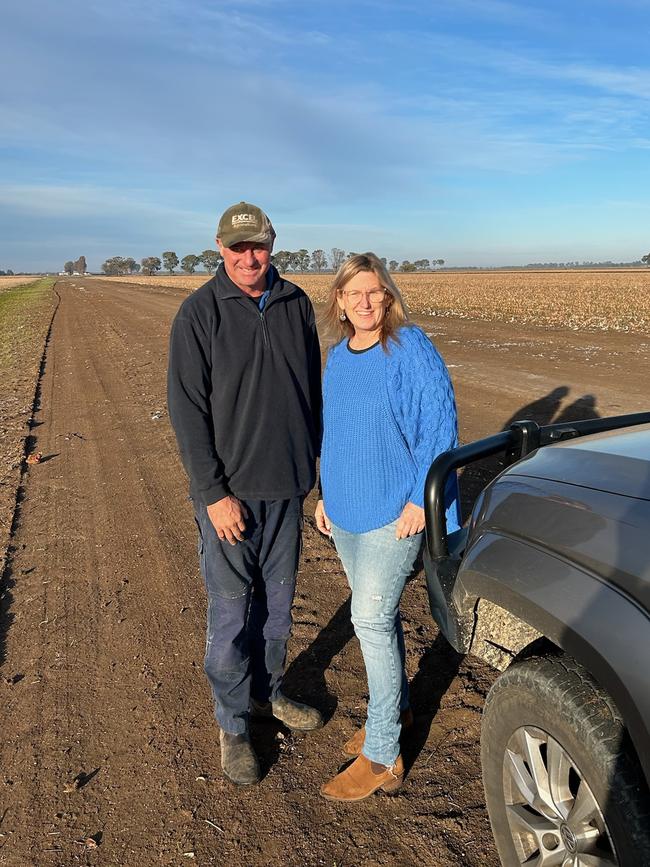Coleambally cotton couple getting noticed
This farming couple’s efficiency-first approach to growing cotton and their deep commitment to conservation is getting noticed.

It’s the farm makeover that was two decades in the making but the Bellato family are proof that efficiency pays.
Whether that’s efficient use of land, water or labour, David and his wife Julie make sure their holding of 800ha near Coleambally, in southern NSW, punches above its weight.
What they do is getting noticed – in 2023 they were judged the Southern Cotton Grower of the Year and this year, they are one of three cotton growers nationwide to be selected as a high achiever in the industry’s awards.
It’s a remarkable vote of confidence, given they planted just 100ha of cotton this summer and were up against growers who had vastly bigger operations.
But their nomination was recognition not only of their skills in growing cotton, but how it fitted into their efficiency-first regime.
The Bellatos family operation – known as Greenline Farming – was a mix of rice, wheat and sheep.
And the move into row cropping was the first decision based around efficiency. While others in the district could grow rice crops on 12 megalitres a hectare, the ground the Bellatos had meant they had to use 50 per cent more water to get the same result.
But what made their soils inefficient for rice made them perfect for row cropping, hence their decision to trade rice for summer crops that grew well on beds.
MAXIMISING MOISTURE
Their first foray was into maize, a crop which David said remained one of his favourites.
Planted on 1.83m beds, corn grew well and to this day, remains part of the rotation.
This year, the Bellatos grew about 120ha of maize which produced 16 tonnes/ha.
But the beds also now grow cotton, pop corn and soyabeans in summer, and Durum and hard wheat in winter with the goal of harvesting three crops every two years from the same area.
That’s in theory, though in practise, it takes some doing.
A case in point was the cotton crop this year. It yielded well at an average of 15 bales/ha and up to 16 bales/ha in some paddocks.
But in the efficiency drive to maximise soil moisture left over from cotton growing as well as maximising land use, getting a wheat crop in after the cotton was harvested was a tight proposition.
“We don’t have a cotton picker because our own cotton area does not warrant it, so we were waiting on a contractor, and two days before he was due, it rained,” David said.
“When he could get on, we had the picker in the paddock and the mulcher at the same time, straight after the cotton was being picked, so we could sow the wheat, then we got 30mm straight after it was sown.
“It all happened within a couple of days and it had to happen or we would have been delayed planting our wheat crop and that could cause issues at the other end of the season.
“You have to be really organised and it can be quite intense with getting one crop off and another in, but it is important to make the most of the soil moisture.
“And given we don’t have a large farm area, it is also important to make sure we are making the most of the land too.”

MAXIMISING LABOUR
The summer crop selection is a deliberate mix to maximise labour use, as well as deliver cash flow.
The summer crops – cotton, soyabeans, maize and pop corn – are all sown at slightly different times allowing machinery and labour to be utilised through spring.
Harvest is the same – the popcorn comes in first in February-March, followed by the maize, then soyabeans in April and then the cotton.
While the cotton picking is outsourced, the Bellatos have their own header to strip their other crops and David said they could justify the cost given it was used for the two varieties of wheat as well as the pop corn, maize and soyabeans, albeit with different header fronts.
Different crops and double cropping have undoubtedly boosted returns and yields, and in most seasons, cotton comes out on top in terms of profits.
Yet there is no desire to boost the area of cotton grown each year, with a strategy of rotations which sees cotton planted in an area only once every four years.
“We have found that we can keep disease and pest pressure down in cotton by doing it this way,” David said.
And the mix of crops also allows the operation to hedge its bets, as invariably there are price fluctuations in commodities.
But the crop selection and how it is sold also builds cash flow into the business.
The pop corn, which this year yielded 9 tonnes/ha, is stored on farm and sold on a B-double load basis throughout the year.
David said it had been a stellar year for pop corn in terms of yield, and they usually worked on half the yield of maize, but about double the price per tonne.
The soyabeans are graded on-farm and sold direct to the manufacturer, Vitasoy at Albury, in one tonne bulker bags, again across a longer time period.
Maize is usually stored on farm, for while it is a high yielding crop that David loves to grow, marketing it can be a challenge.
“We have 4000 tonnes of storage and if you are growing maize, you need to be prepared to store and sell after harvest, as prices can be low during harvest,” he said.
“The soyabeans and pop corn provide constant income throughout the year and that can be really handy when you are coming up to planting in spring and you have bills for chemicals and seed and fertiliser.”
WATER EFFICIENT
Whether it is popcorn or cotton, or any of the other crops, irrigation in the 375mm rainfall country is key to success, and provided by a mix of surface and bore water.
And getting that water on and off the paddock, in as efficient way as possible, is vital.

It’s here the labour/water/land efficiency mantra kicks in again.
The Bellatos had used siphons to water their row cropping area, but have moved to bankless channels for a number of reasons.
“It was costly to set up and thankfully we have our own earth moving gear, but the concrete structures are still quite an expense,” David said.
“But we can now water all our farms switching on the irrigation by phone, and it takes half an hour.”
The irrigation bays, which range in size from 10-12ha up to 18-20ha, have bankless channels on both sides. There is zero gradient across the bay, but the bay below it is a 20cm drop. It means water flows onto the bay from each side, and off again quickly.
The final bay, once the water has flowed across the rest of the paddock, is about half the size of the other bays. This means when the water is turned off, the last area it flows onto uses it all and there is little if any waste.
“This is making really efficient use of water, but also of our labour,” David said.
And while Greenline Farming is getting into the headlines for its cotton growing prowess, the Bellatos will keep it as just one of their crops rather than boost the area.
“We have found crops that need the same ground preparation, that can fit well with each other and that we like growing,” David said.
SOCIAL VITALITY
Greenline Farming is an example of how agriculture can be deeply intertwined with community engagement and conservation efforts.
As part of the judging for the prestigious cotton awards, the Bellatos’ commitment to their community and the environment played a significant role.
Julie Bellato’s innovative venture, Muddy Duck Tapas and Events, located in the small village of Coleambally (with a population of just 600) has become a beacon of social and economic vitality.
“Establishing a trendy cafe and tapas cocktail bar in such an isolated community is no small feat,” Julie said.
“Muddy Duck Tapas and Events embodies the ‘paddock to plate’ philosophy, showcasing locally grown produce in creative ways.”
Visitors can enjoy dishes made from wheat, maize, popping corn, rice, and soyabeans, all sourced from the surrounding farms. Additionally, the venue highlights the journey from cotton farm to fabric, featuring eco-friendly homewares from popular brands like Sage and Clare.
Julie sees Muddy Duck Tapas and Events as more than just a business.
“It’s a social enterprise that provides a crucial gathering place for the community,” she said.
“In an area where social isolation can be a challenge, the bar offers a space for people to connect over good food and drink.
“It also serves as a venue for local events and educational courses, contributing significantly to the economic and social development of Coleambally.”
Julie believes that initiatives like this are vital for addressing mental health issues in isolated communities.
Beyond their contributions to the local community, the Bellatos are deeply committed to conservation.
With Julie’s background in revegetation and landcare, Greenline Farming is an integral part of the Local Land Service’s Black Falcon project, which aims to protect the endangered species. “This commitment to environmental stewardship is a testament to our dedication to preserving their land for future generations,” Julie said.
“We have already demonstrated that our farming practices extend far beyond traditional agriculture.
“Through our efforts, we are fostering a stronger, more connected community and ensuring the conservation of the natural environment.”




